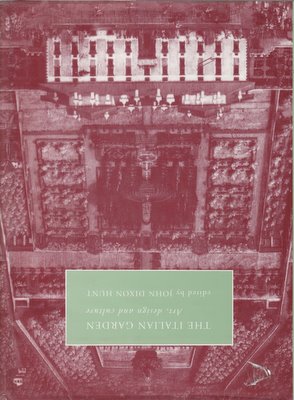John Dixon Hunt edited a book on The Italian Garden: art, design and culture (Cambridge University Press, 1996). He is now working with Michael Leslie on a six volume Cultural History of Gardens (scheduled to be published by Berg Publishers in 2011): The blurb states that “Michael Leslie is Professor of English at Rhodes College. He was founding co-editor of the Journal of Garden History (now Studies in the History of Gardens and Designed Landscapes – SHGDL) and Senior Fellow in Landscape Architecture at Dumbarton Oaks (Harvard). John Dixon Hunt is Professor of Landscape Architecture at University of Pennsylvania. He was previously Director of Studies in Landscape Architecture at Dumbarton Oaks and is editor of the journal, SHGDL and series editor of the Penn Studies in Landscape Architecture.”
The book on Italian Garden indicates what is meant by the term ‘cultural history’ . It is the work of ‘a distinguished group of Italian, American, English and German scholars, with different backgrounds in art history, literature, architecture, planning and cultural history’. I appreciate the study of every aspect of gardens but am most interested in the questions of how and why they were designed, which appears not to be a significant aspect of ‘cultural history’.
The 1996 Italian Garden Chapter of most interest to me is D R Edward Wright’s ‘Some Medici gardens of the Florentine Renaissance: an essay in post-aesthetic interpretation’. He concentrates on the social use of gardens, a topic of much concern to designers but often neglected by garden historians. Wright comments that it is ‘as if human use of planned environments was a mere afterthought to an essentially artistic endeavour’. He distinguishes between the high society uses of the Boboli Garden, the relatively pastoral use of the Villa Castello – as a health resort, and the use of Pratolino as a hunting park. I hope the projected Cultural History of Gardens has more chapters like this and fewer literary canapes than Italian Garden.


Tom, I think you have given us the downunder view of the book!
Would that be ‘downunder’ as in ‘a mechanic’s view’ or as in ‘Australian’ – or both?
That would be for all those people standing upside down on the bottom of the world the title of the book is entirely readable in its current orientation!